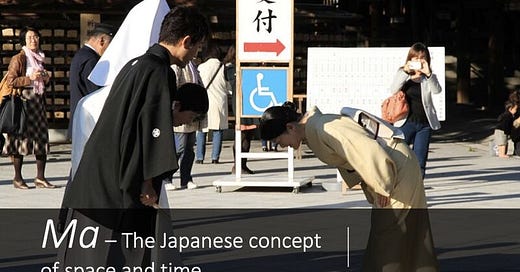Recently, I read a post by Kiyoshi Matsumoto, “Ma, The Japanese Concept of Space and Time.” In the post, Matsumoto speaks of the concept of “Ma,” represented in the Kanji (Chinese character) “間.”
Matsumoto uses the character makeup of “Ma” to describe its meaning, “The kanji symbol for Ma (間) is the combination of door “門” and sun “日,” where Ma is the gateway of illumination of all things.”
The meaning of the same traditional Chinese character above, or the simplified character 间, both carry the same idea of “space.” However, not commonly used alone, we can see it with other characters, thus we see clearly the idea of “space.” Two Chinese examples “空间 emptiness-space” and “时间 time-space” support the meaning expressed by Matsumoto in his post.
“The concept of Ma is integral to Japanese thought and action, engrained within the individual and society. With Ma the space between words, sounds and actions take on clarity and distinctiveness. Ma is about the emptiness between things, about the silence between the sound, the respite between activity and the pause between thoughts.“
Birth is a beginning and death a destination, and life is Ma. ~Kiyoshi Matsumoto
As I read the article, my thoughts immediately connected with my mindfulness practice and focusing on the gaps between the thoughts—the space. Thoughts can be difficult to control and they can also be sneaky, almost evasive.
In my upcoming book “The Heart Of China, How Mindfulness Changed My Life,” I refer to the idea of focusing on the gap between the thoughts with the metaphor of thoughts as being ‘fish.’
“Imagine standing in a pool of water up to your neck. You stand still. There are fish swimming around you. Now, imagine that the pool is your mind in the present moment and the fish represent your thoughts. Eventually, some of the fish will brush up against you and you will become aware of the fish. “Oh, a fish just brushed up against me.”
You could become engaged with the fish and wonder where it went, if it will brush up against you again, or even question if it bites. Alternatively, you can simply continue standing in the water quiet in the present moment.” — Book Excerpt
Ma is typically Zen, thus a very Japanese way of thinking about space and time. ~Kiyoshi Matsumoto
The idea of ‘space’ is powerful. Respecting space gives us more room to move, no matter the space in which we find ourselves. Space, from the universal perspective, is absolute. It has no beginning or end, much like the concept of “道 Tao,” outside of which nothing exists.
How Matsumoto describes it, “Ma” seems to be a tool that respects space and affords others space. It becomes an expression of respect, acceptance—an invitation of sorts.
No matter the space between us or the space between our thoughts—this concept of space lives in a profound cultural sense of peace, harmony, and connection.






